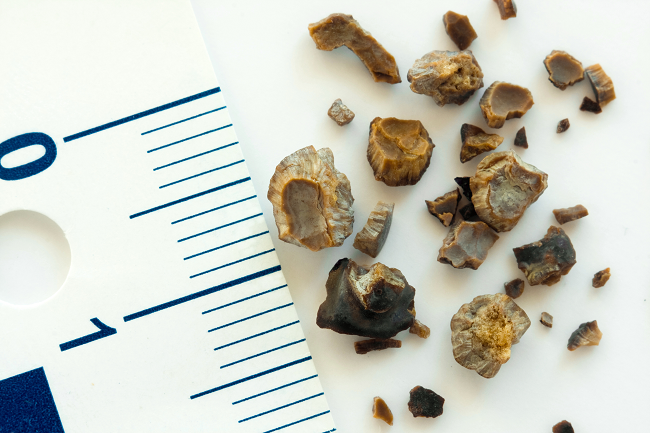It starts suddenly with a sharp, stabbing pain — usually in the flank or lower abdomen. As the waves of pain progress, nausea and vomiting may occur. No matter how hard you try, the pain won’t go away. What could cause such a sudden problem? It could be a kidney stone.
Kidney stones are one the most common reasons for seeking medical care. Stones affect approximately two to three percent of the population and account for seven to 10 out of every 1,000 hospital admissions. Moreover, the Chattanooga area is described as the “Stone Belt” due to the high rate of kidney stones in people living from North Alabama to North Carolina.
Kidney stones form when crystals of certain substances, such as calcium, oxalate, or uric acid, are produced in the urine. These crystals may form when the urine is too concentrated, too acidic, or too alkaline. Also, low levels of substances that inhibit crystal formation, such as citrate and magnesium, may contribute to the development of kidney stones.
Risk factors
The main risk factor for developing kidney stones is dehydration. If you don’t drink enough fluids, especially water, your urine will become very concentrated, increasing the likelihood that a stone crystal will form. Also, a diet high in protein (meat, fish, or chicken) and low in fiber (fruits and vegetables) may increase the risk of stones. Certain diseases, such as gout and hyperparathyroidism, and may result in kidney stones. And if anyone in your family has had kidney stones, you are more likely to develop them as well.
Treatment options
Approximately half of the people with small stones, 4mm in size or less, pass them on their own. If you can control the pain with oral pain medications and have no nausea, vomiting, or fevers, drinking plenty of fluids may flush the stone out spontaneously. However, less than 10 percent of stones greater than 6mm in size will pass on their own.
If you have any signs of infection, if your pain is uncontrollable, or if you have persistent nausea and vomiting, the stone may have to be crushed by high-energy shock waves or removed by other surgical methods at the hospital. Be sure to consult a physician if you experience any of these symptoms.
Tips
Here are four tips for preventing kidney stones:
- Drink at least two liters of water per day.
- Try drinking real lemonade. It’s a good source of citrate, which can inhibit stone formation.
- Eat a low protein and low sodium diet. Less protein in your diet can reduce acidification of urine, which can contribute to stone formation.
- Avoid foods high in oxalate, such as spinach, rhubarb, beets, nuts, chocolate, wheat bran, strawberries, peanuts, almonds, tea, and grits.
For more information or to make an appointment with a UT Erlanger Academic Urologist, call 423-778-2564.







